 |
Eternal Summer (2006) |
 |
 |

 Shane and Jonathan first meet at a primary school by the sea. Shane is the class clown, while Jonathan is the no.1 student. One day, the teacher sets up a game called “Little Guardian Angel” where good students are paired with bad students in order to reform them. Against his will, Jonathan is paired with Shane. What starts off as an awkward friendship gradually evolves into forbidden love. Shane and Jonathan first meet at a primary school by the sea. Shane is the class clown, while Jonathan is the no.1 student. One day, the teacher sets up a game called “Little Guardian Angel” where good students are paired with bad students in order to reform them. Against his will, Jonathan is paired with Shane. What starts off as an awkward friendship gradually evolves into forbidden love.
 What's so special about this new romantic-sorrowful flick isn't its brief daliance with gay love, nor its category III rating in Hong Kong. The rating no one should get worked up over, since they seem to be dishing them out like there's no tomorrow nowadays with little regard for actual content. In Eternal Summer's case it's likely due to a super short scene depicting the two male leads naked in bed and doing the nasty, something even the ho-hum Brokeback Mountain managed to get right with less fuss. What's so special about this new romantic-sorrowful flick isn't its brief daliance with gay love, nor its category III rating in Hong Kong. The rating no one should get worked up over, since they seem to be dishing them out like there's no tomorrow nowadays with little regard for actual content. In Eternal Summer's case it's likely due to a super short scene depicting the two male leads naked in bed and doing the nasty, something even the ho-hum Brokeback Mountain managed to get right with less fuss.
No, Eternal Summer dances around its main point to an exaggerated degree, in the end causing us to wonder what that point was meant to be to begin with. Rather, what's so special about this one is its membership in a very exclusive club of movies with enough projectile velocity to break free of Taiwan, where it was made. Taiwanese cinema has become rare, something we lament. For that only, Eternal Summer demands your support.
It unfortunately possesses scant few other redeeming traits. Viewers can see the whole gist of it from the get-go, and in its arsenal of tricks exist no better weapons than an age-old threesome of young and restless characters in search of definition. But they hardly do much to find meaning, which is likely a still-life phenomenon someone like Taiwan-based mastermind director Hou Hsiao Hsien would have worked wonders with. But trusted to 25 year-old Leste Chen (The Heirloom) it all comes across flat and uncompelling. Never mind, young auteurs like that require our attention and moviegoing prowess, so we're willing to take an uninspired story as part of proceedings.
Two additional newcomers do the main two protagonists, rebellious James Dean-type Shane by the darkly alluring Joseph Chang and geeky, lost soul Jonathan via Bryant Chang. Their characters meet as young boys at a rural school when Jonathan is asked by a teacher to buddy up with attention-lacking Shane as a means of getting the weaker student into the swing of things, and the rest constitutes a very short history.
Years later, they're best friends, almost inseparable and with an undercurrent of attraction not entirely par for the course, although that part is left for audiences to quite easily deduce on their own.
Into the mix is then thrown Carrie, played by sexy tomboy Kate Yeung, who we've before seen in Mighty Baby and The Eye 10. This young lady gives mid-90's Liv Tyler as serious a marathon for her money as can be arranged, easily stealing the show with her range of facial expressions and sincere, almost jocular attitude. She's largely wasted in Eternal Summer, with a skillset far more suited to the sarcastic niche filled by fellow youthful lovelies like Cherrie Ying.
All this takes place as the trio gets ready to finish high school and move on to college, and the plot follows them as they do so. One neat aspect of Eternal Summer is how it effectively excludes everyone else, forcing the story to highlight only the three as if they were the epitome of iconoclastic social angst. This does work, but lacks the power and impact derived from a truly interesting story to back it up.
Love and emotion get their two cents in as Jonathan and Carrie begin a timid exploration into the world of lust, something merely glanced in a missed opportunity transpiring at a Taipei love hotel. Then the balance of pheromone power shifts to see Carrie and Shane give it a go, with friendship remaining at the forefront all along.
Sure there's a desire to find out more about what drives people as they discover new ground in themselves. And the rustic, faux-retro feel (looks like they were indeed going for a late 90's setting) helps in avoiding gimmicks and other lifestyle distractions. Yet, Eternal Summer goes by unnoticed almost, and by the time its so-called sensational climax arrives the average viewer would be challenged to do more than tick a box on a checklist. Yes, it's still not a commonplace theme in cinema overall, let alone Asian cinema, but so much more could have been done with it.
Seriously, given a more mature crew at the wheel, Eternal Summer could have been deftly transformed into something to talk about for a while as a symbol of encompassing gay themes, or at the very least as a brain-boggling surreal love flick in the vein of 1999's Where Have all The Flowers Gone with Zhou Xun.
Bereft of potency, Eternal Summer inhabits a perpetual limbo state populated by movies that look good (the Taiwan countryside makes for some lush environs), are capably written on paper and could have been infinitely more aggressive in going about their business, but didn't. That's a shame and not the type of shot in the arm Taiwan's filmmakers need. We're still waiting for that particular season to come along.
6/10
|
 |
 |
Lee Alon 1/30/2007 - top |
 |
 |
Wo Hu (2006) |
 |
 |
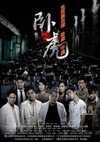
 The new Triad drama from director and editor Marco Mak is quite simply essential viewing; a dark and realistically gritty story of cops and gangsters shot beautifully and with one of the best ensemble casts seen for a very long time. Wo Hu is literally ‘stunning’, and should be seen by audiences everywhere who enjoy a genuinely great film. The new Triad drama from director and editor Marco Mak is quite simply essential viewing; a dark and realistically gritty story of cops and gangsters shot beautifully and with one of the best ensemble casts seen for a very long time. Wo Hu is literally ‘stunning’, and should be seen by audiences everywhere who enjoy a genuinely great film.
The story is based around the alleged one thousand undercover officers planted in various Triad groups in Hong Kong by the Hong Kong Police in order to tackle crime in the city. After one undercover officer’s identity is discovered and he is murdered, Inspector Wai (Miu Kiu Wai) mounts pressure onto the suspected gang whilst trying to prevent the deaths of any more officers. In the spotlight of the investigation is Lai (Eric Tsang), an unlikely criminal and hopeful romantic who is greatly respected by the gang. Other central members of the gang are Wah (Francis Ng) and Yau (Jordan Chan), starkly different men, one a caring father who toys with the idea of leaving with his family and the other a crooked up and coming gangster. As few know the identities of the real undercover moles, suspicion brews in the group and makes for an uncertain finale. Meanwhile, many of the men hold deep, dark secrets, which they keep from the world and those around them. This will ultimately affect their decisions in the events that follow.
For a film of its theme and content, Wo Hu is exceptionally moving and paints a sympathetic and operatically tragic portrait of people who will ultimately suffer at the cost of a war far greater than any of them. The characters in the story are flawed and continue in the paths they’ve taken for years because it is all they know. Ultimately, it is a story of redemption and forgiveness that tragically few in this world, on either side of the law, will likely receive. The simple, emotional compositions of Wan Hiu Yung drive more truth from the characters than the dialogue ever could. And it is the scenes of stillness and quiet reflection that give the film a highly stylized and eerily calm experience. Wan Hiu Yung is a relatively new composer who will undoubtedly be hugely successful in the industry as he demonstrates, here, a clear talent in creating a score that contributes perfectly to the scene, rather than dominate it.
The cast is nothing short of incredible. To have these actors alongside each other seemed fantastic in itself but the fact that they all complimented each other and worked together so harmoniously makes this one of the best casts I have seen for a very long time. Eric Tsang, as usual, is absolutely perfect as the quiet, charming gangster, a definite favorite among the audience. Francis Ng gives what is perhaps his best performance since Infernal Affairs II as a reluctant mobster who will switch from being a quiet caring father to a menacing psychopath with just a change in his eyes. Former Miss Hong Kong, Sonija Kwok deserves a mention as she appeared both visually captivating and also gave a sweet and grounded performance as Tsang’s love interest. If she can follow a similar path to Chingmy Yau, she could potentially have a very strong film career ahead of her. There simply isn’t time to go into every actor, but they all worked perfectly and stretched their individual styles into new dimensions under the meticulous direction of Marco Mak.
This is without doubt one of the best Hong Kong films of 2006 and it offers a new and artistic vision to the gangster genre. It should be seen by Hong Kong fans, gangster fans, drama fans, and romance fans. There is little left out from such a rich film, and although it is essentially a crime film, it isn’t likely that you’ll have seen one produced quite this way. Wong Jing, working as producer, moulded a modern masterpiece here and has proven once again that he can work on serious, quality cinema. Wo Hu is an emotionally driven entry -- a moving experience.
Very highly recommend.
|
 |
 |
Mike Fury 1/10/2007 - top |
 |
 |
Confession Of Pain (2007) |
 |
 |

 Now here's a good waste of pent up potential, with one of the bigger Asian movies of the 2006 holiday season culminating in a largely uninspiring mixture of several elements that by all rights should have worked well together. At least the title is very apt for what transpires, though. Now here's a good waste of pent up potential, with one of the bigger Asian movies of the 2006 holiday season culminating in a largely uninspiring mixture of several elements that by all rights should have worked well together. At least the title is very apt for what transpires, though.
With both Tony Leung Chiu Wai and Kaneshiro Takeshi throwing in their weight for this one, there seems no plausible reason for failure, as the two aren't only capable thespians and impressive on-screen, they've previously done good when working on the same project, to wit Chungking Express. However, this time around we are presented with a mediocre release that dabbles a bit too much in a wide array of influences ranging from crime sagas to supernatural thrillers. Confession of Pain (COP) actually nails none of those right smack on the head.
It starts in 2003, presumably on Christmas Eve, as dashing detective Bong (Kaneshiro Takeshi) and his commanding officer Lau Ching Hei (Tony Leung) celebrate the festival by raising toasts and chasing down psychotic criminals. This is where you begin to notice that the movie needs to fess up to more than just it's title: so much is held back, it is as if audiences are expected to surmise literally everything on their own. Not necessarily a bad thing, but COP doesn't do very well with its hint-sprinkling, causing more frustration than anything else. And as every semi-intelligent moviegoer will tell you, most cases of this ilk inevitably lead to one obvious resolution or another, which certainly happens in this case.
At any rate, these first scenes also showcase COP as a product very much endorsed by the Hong Kong government's infatuation with all things touristy, as car chases and other movements traverse the city's more glamorous and unique locales, even if geographically they don't always seem to make too much sense put next to each other like that. Following a few dark but celebratory successes, the story fast forwards three years to a present tense where Bong faces such tragedy he's moved to quitting the police and switching to the life of a perpetually drunk private eye. Conversely, the more disturbed Lau Ching Hei seems to have hit paydirt, marrying Susan, daughter of a rich businessman. She's done by excellent Xu Jinglei (Spring Subway, Dazzling, My Father and I), and forms the first half of this movie's dominant cast, the ladies. Her complement is Shu Qi, finally recovered from being a thin sliver in Three Times, and looking so sexy you can't get enough of her sweet, giggly portrayal of bar girl Fung. Although Xu Jinglei's northern, Beijing-derived manner isn't exactly at home in a Hong Kong-centric production (plus it's obvious she was dubbed over), Shu Qi's gorgeous visage, extensive Fragrant Harbor filmography and fluent Cantonese mean she's totally like a fish in water here.
Without these two, COP would be close to a total loss. Fortunately, beyond the two female leads, it also possesses an uncanny knack for visceral violence. This is first evinced by a brutal sequence where Susan's wealthy dad gets clobbered over the head with a bronze Budha, with COP sparing us next to no detail. This continues in a few other scenes later on, and we commend directors Lau and Mak for deciding to go with it almost all the way.
Another trait worthy of note is the film's unceasing attempt to throw viewers off. Important events are played and replayed from different perspectives on several occasions, and all seem perfectly reasonable as the story veers ever closer to a who dunnit. So, while COP is basically a blunt tale of violence, suffering, tragedy and revenge, it nonetheless attempts to rise above its simple building blocks with an almost clinical inability to stay still. Does this angle work? Not nearly as well as we would have liked it to. In the end, COP doesn't dish out enough interesting hints, red herrings, easter eggs or even crusty Christmas fruitcake to really intrigue. And even in the brief occasions when it does have you enthralled, the knowledge that sooner or later it'll all come crushing down precludes serious contemplation. This is no David Lynch outing.
As mentioned before, none of the components introduced really get full play. Although Takeshi performs Bong to the best of his ability, and is once more a most likable actor, his relationship with Shu Qi's tantalizing Fung goes nowhere, as the girl pretty soon becomes little more than a comic relief sidekick. The police element isn't explored with any seriousness, featuring several cameos by Chapman To as a officer Tsui, a hapless fellow investigating the bizarre occurences revolving Susan and her ersatz father. He adds very little to COP, something we regret. Tony Leung, on the other hand, was probably intended as a flatter character, and so we don't feel he was robbed of opportunity as much. Overall, he carries the aloof, surgical Lau Ching Hei with acceptable prowess.
In the end, for something so apparently ambitious, COP gives you very little to take away and mull over, save for Shu Qi in tight jeans and minuscule outfits, but the less we know about what you do with that, the better. A more cohesive storyline would have been preferable, and of course injecting the thing with more elaborate, inventive conventions is high on the list of wish-they'd-thought-of-that's. To all intents and purposes, we are giving it a pass, yet with the females of the species looking so good and working so well in Confession of Pain, it's a guilty pleasure you may want to allow yourself this time of year.
Rating: * * *
|
 |
 |
Lee Alon 1/4/2007 - top |
 |
 |
Crime Story (1993) |
 |
 |
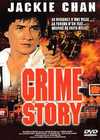
 Kirk Wong’s daring and gritty action-drama, based on true events, sees Jackie Chan breaking away from his usual formula and making Crime Story a darker experience for those accustomed to his action-comedy style. Kirk Wong’s daring and gritty action-drama, based on true events, sees Jackie Chan breaking away from his usual formula and making Crime Story a darker experience for those accustomed to his action-comedy style.
Detective Chan (Jackie Chan) is put in charge of security duty for a wealthy business entrepreneur (Law Kar Ying) who is threatened by gangsters and has been kidnapped for a high ransom once before. When Mr. Wong is attacked and kidnapped along with his wife, and a police officer is brutally killed in the process, Chan is assigned to work with veteran detective, Hung (Kent Cheng) in solving the case. But Detective Chan is unaware that his new partner is working alongside the kidnappers and using his position from inside the police to steer the investigation away from the gang and get the ransom paid fast. With Chan’s work leading the police ever closer to the kidnappers, and getting Wong back alive, as well as Hung interfering at every turn, while hiding his true motives, it is unclear who will live to walk away from this nightmarish situation.
Crime Story clearly does not reflect the usual Jackie Chan formula, and hardcore fans of his comedy-blended martial arts action may be surprised to find a somber drama with a lot more gun action that martial arts. However, it arguably represents a more serious piece of Jackie’s career and while it may not stand up to fan favorites like Project A and Police Story, it is worth seeing purely for the intense performance that Chan delivers. This, and Police Story 3 of the same year, were the first cases where Jackie allowed his work to be moulded in the hands of other directors. Kirk Wong creates a powerful and visually grainy style, which frames the story, and style of the screenplay perfectly. Combined with this, Arthur Wong’s cinematography is stunning, utilizing many bright lights and glowing visuals in dark locations, such as the famous scene in the hull of a ship, in which we see threads of light puncturing the darkness, chains rattling and glimmering and water scattering around the action. Kent Cheng’s performance is quietly menacing and the way he is seen to turn slowly to Chan when his back is turned, and give a stare that seems to combine fear and defense proves Cheng is to be one of the most dynamic actors in Hong Kong today.
It is also important to note that the already intense and emotional performance Chan delivers would have been even more so if the screenplay remained completely accurate to the real events. The real Detective Chan was said to have suffered immense trauma following an off-duty shootout with some robbers, a scene shown near the start of the film, which followed with a psychological analysis concluding that he suffered from guilt after taking lives. Jackie allegedly toned this down substantially when overseeing the screenplay as he wanted to avoid it becoming too heavy-handed. This trauma would distract him and interfere during the Wong kidnapping and affect his mental state during the case. Having read about this, I would have liked to see Jackie immersing himself in this kind of dramatic role, nevertheless based on the changes made, the film still provides a well-developed insight into the conflict of Detective Chan, both with himself and the gangsters he is hunting down.
For the serious action-fans of the ‘Little Dragon’, there are still some spectacular scenes, namely the incredible car chase in which Chan anxiously races to the kidnapping-in-process, and some incredible pyrotechnics, courtesy of action director, Bruce Law. In all, this sticks out as quite a different type of Jackie Chan film, and that is exactly why it should be seen. It may not be his most popular, but it couldn’t be better at showing off the versatile star that he is. Highly recommended for all fans of serious cinema.
|
 |
 |
Mike Fury 1/4/2007 - top |
 |
 |
Hong Kong Godfather (1991) |
 |
 |
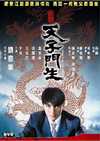
 When the boss of a highly profitable triad is forced to flee to Macau, rival gangs swoop in to steal any pieces of the action they can. Andy Lau becomes the triad's acting boss, and must do what he can to handle the difficult situation. When the boss of a highly profitable triad is forced to flee to Macau, rival gangs swoop in to steal any pieces of the action they can. Andy Lau becomes the triad's acting boss, and must do what he can to handle the difficult situation.
 Lo Lieh’s action-fuelled Triad story takes a surprisingly balanced approach to the conflict between police and criminals and the result is a highly energetic gangster drama, with a great ensemble cast to match. Lo Lieh’s action-fuelled Triad story takes a surprisingly balanced approach to the conflict between police and criminals and the result is a highly energetic gangster drama, with a great ensemble cast to match.
York Koo (Andy Lau) is voted in as acting head of the family Triad when the boss is forced to flee from Hong Kong. As the new head of the family, the inexperienced York must deal with a vast array of problems, including mounting pressure from the Royal Hong Kong police. Fronting the case is Officer Leung (Roy Cheung), a very determined outsider cop who, having just been reassigned from duty in the UK, is unfamiliar and unsympathetic to the often comfortable relationship between cops and Triads. York is also faced with strong opposition from rival gangs who plan on taking advantage of the old boss’ departure, and the vulnerable state of the family business. York’s biggest problem is a rival boss (Lung Fong), who launches attacks on both York’s business, and members, at every opportunity. Concerned with the inevitable outcome, Officer Leung and his colleagues run back and forth, struggling to prevent all-out war on the streets of Hong Kong, but as tension builds, the climax of this conflict looks increasingly bleak.
Hong Kong Godfather is not the best and hardly the most original film of its genre, but the most impressive aspect for me was that it showed an unusually balanced divide between the cops and the Triads. This has since changed, with films such as the Infernal Affairs trilogy giving a far greater emphasis on the grey area that exists on either side of the law. Yet in this film, especially for the period of 1980s and early 1990s gangster films, a clear balance is actually shown, and neither side come across as wholly good or evil. Therefore there is conflict shown on all fronts, whether between gangs, themselves, or between police officers, or between the gangs and the police. This improves the feel of what is otherwise a basic action thriller because it allows interesting characters to grow under the varying circumstances. York begins his journey as an inexperienced, relatively sheltered gangster, who rises to the challenge when the organization is set to crumble. Regular supporting actor, Tommy Wong, gives a great performance as the exasperated, irrational son to the old boss who grows increasingly impatient with negotiations and meetings and would rather wage war all by himself. Andy Lau gives a reasonable lead performance that satisfies basic requirements, but in my opinion he was simply not as good an actor at that time as he is today. Therefore, anyone better acquainted with his far more impressive performances in later films, like Century of the Dragon, Wong Jing’s A True Mob Story, or of course Infernal Affairs, may be a little disappointed in this role that feels a little bland and empty. Roy Cheung undoubtedly steals the show here, as a multi-dimensioned cop who is given enough freedom in the writing to explore his varying characteristics, and generally gives a far more confident and believable performance. Therefore, an otherwise fairly rudimentary story is given some great characters and interesting opportunities to explore new areas of a heavily covered genre.
Stephen Tung also creates some very chaotic but tightly choreographed action sequences, which flood the screen with quite brutal violence, and not the balletic action you might expect. The action here is more bloody and realistic, and sets a much darker tone for the story. I would certainly recommend this for any fans of Lo Lieh and gangster fans in general. It may not be the greatest film of its genre, but it certainly contributes something a little different and something you may not have seen before.
|
 |
 |
Mike Fury 1/4/2007 - top |
 |
 |
Don't Give A Damn ! (1995) |
 |
 |
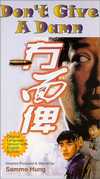
 Sammo Hung teams up with Yuen Biao playing two cops on the trail on a drug smuggling gang. Sammo Hung teams up with Yuen Biao playing two cops on the trail on a drug smuggling gang.
 Two out of three is better than none! What we have here is the film that was set to reunite Hong Kong’s ‘Three Lucky Sons’ for the first time since Dragons Forever. But supposedly due to obligations on another project, Jackie Chan was forced to pull out, and Takeshi Kaneshiro was cast in his place alongside the two remaining ‘Dragons’, Sammo Hung and Yuen Biao. Don't Give A Damn ! is a reunification that received mixed reviews. But as a major fan of all those involved with the project, I was not disappointed! Two out of three is better than none! What we have here is the film that was set to reunite Hong Kong’s ‘Three Lucky Sons’ for the first time since Dragons Forever. But supposedly due to obligations on another project, Jackie Chan was forced to pull out, and Takeshi Kaneshiro was cast in his place alongside the two remaining ‘Dragons’, Sammo Hung and Yuen Biao. Don't Give A Damn ! is a reunification that received mixed reviews. But as a major fan of all those involved with the project, I was not disappointed!
The story follows a rough and irrational Hong Kong detective (Sammo Hung), constantly embarrassing his department and getting himself into trouble with his superiors due to his unethical methods. While investigating a Japanese drug smuggling circuit, he soon discovers he is not alone on the case, and an irritating customs officer (Yuen Biao) is investigating the very same gang. Having already disagreed whenever they cross paths, both men are shocked when a new, by-the-books Superintendent (Kaneshiro Takeshi) teams them up for the case. What follows is plenty of fights and friction between the two, until they put aside their differences in order to bring down the drug dealers.
One point worth noting is that the film does not possess the same degree of energy or charisma of any previous films from this team. The absence of Jackie Chan undoubtedly contributed to this, however, there are many points where the film does work and demonstrates Sammo’s ability handling a different style of filmmaking to fit these different circumstances. Firstly, there is a clear emphasis on the crazy, larger-than-life characters rather than strictly martial arts action. Cameos by stars like Wu Ma, Richard Ng and Billy Lau add to this and give these elements of the story a style similar to those found in the ‘Lucky Stars’ series.
The overriding impression is that Sammo decided to alter his M.O. to accommodate circumstances different from earlier projects. As it happens, this is not necessarily a bad choice and in fact this allows a different formula to come together. All three main stars have their comedy moments, but the vast majority of action is given to Sammo Hung and Yuen Biao. Kaneshiro Takeshi plays the straight-laced superintendent very well and contrasts with the typically wacky behaviour of the other two. To show this contrast, the three lead characters are all given adequate screen time to interact and let their starkly different personalities create the laughs. Sammo also appears to use the romantic comedy theme in a more obvious way here, with his character playing a sort of lady killer who becomes involved with various women in the police department --but not to worry as both Biao and Kaneshiro also get their fair share of romance.
With these other themes and areas being explored, there may be slightly less action than some fans would expect - but when the action arrives it really does go into high gear. The final fight against the Japanese Yakuza boss (Kelvin Wong) and an African American gang certainly delivers the moves where expected and ends the film on a satisfying and bruising note.
It’s worth noting that the film has also received mixed reviews due to a controversial scene in which Yuen Biao and Kaneshiro Takeshi paint themselves with makeup in order to infiltrate the African American gang. Within this segment, some viewers may also be shocked by the subsequent dialogue that is exchanged, something worth bearing in mind prior to seeing the film.
In overview, Don't Give A Damn ! represents a different style of Sammo’s work, and while it may not stand up to undeniable classics and fan-favourites like Dragons Forever and Wheels on Meals, it is still worth seeing as an interesting and entertaining portion of the stars’ impressive careers. There are also a few things you’ll be hard pressed to find elsewhere --Sammo Hung sporting a bizarre ponytail, Yuen Biao with a goatee beard and Kaneshiro Takeshi proving a strong aptitude for deadpan comedy. There’s still a lot of fun to be had here!
|
 |
 |
Mike Fury 12/11/2006 - top |
 |
 |
After This, Our Exile (2006) |
 |
 |

 Good looks. Charming. Ladies man. Male buddies looked up to him. Not anymore. He is a shadow of the man he once was. A man past his prime. He has gambled it all away. He is down and out. And he is a father to a son who is smart and loves his father dearly – though he may not always understand why his father hurts his mother so. So when the mother plots to leave the father, the son informs the father and mother is violently beaten and locked up. But mother schemes to leave anyway after that, the son is left alone with the father. Soon the gambling habits of the father makes a thief out of the son. The son resists but is no match to the father's cajoling and blackmail. The son was finally caught and sent to a juvenile detention center. Father visits him and son bites off his ear. The lost of innocence is complete. Ten years later, son returns to his home town and sees somebody who looks like father – they do not meet. Father and son walks away in different directions. Good looks. Charming. Ladies man. Male buddies looked up to him. Not anymore. He is a shadow of the man he once was. A man past his prime. He has gambled it all away. He is down and out. And he is a father to a son who is smart and loves his father dearly – though he may not always understand why his father hurts his mother so. So when the mother plots to leave the father, the son informs the father and mother is violently beaten and locked up. But mother schemes to leave anyway after that, the son is left alone with the father. Soon the gambling habits of the father makes a thief out of the son. The son resists but is no match to the father's cajoling and blackmail. The son was finally caught and sent to a juvenile detention center. Father visits him and son bites off his ear. The lost of innocence is complete. Ten years later, son returns to his home town and sees somebody who looks like father – they do not meet. Father and son walks away in different directions.
(focusfilms)
 In a surprising twist of linguistics, the English name for Patrick Tam's latest carries a much deeper sense of atmosphere and tragedy than the simple Chinese title, translated more or less as "father". Well, a formal expression of the concept "father", but quite obvious either way. And if one thing it isn't, that's obvious, for Exile serves as an adept reminder that even the most straightforward of stories may require multiple runs to fully appreciate. In a surprising twist of linguistics, the English name for Patrick Tam's latest carries a much deeper sense of atmosphere and tragedy than the simple Chinese title, translated more or less as "father". Well, a formal expression of the concept "father", but quite obvious either way. And if one thing it isn't, that's obvious, for Exile serves as an adept reminder that even the most straightforward of stories may require multiple runs to fully appreciate.
Tam did items like Love Massacre in the past, and hasn't been much of a prolific artist in almost twenty years. This new release, rumored and talked about for over two years, gives the director a respectable shot at a comeback, even though it probably isn't what he was going for, nor is it, frankly, the most astounding, earth-shattering drama to ever grace the silver screen. But it is a sensible, intriguing affair, with quite excellent cinematography, a goodie bag's worth of various ingredients and an at least seldom-visited location setting.
Exile further depicts lean pop star Aaron Kwok in a superb melodramatic turn which has one regularly thinking to themselves, "now that's acting". Just for that kind of pondering about him, Exile surely has merit.
It further puts forth Charlie Young (Seven Swords, New Police Story) as Kwok's troubled life partner, with the couple, A Sheng and Lin, entering the stage as two Cantonese speakers (presumably from HK although that much is never revealed) in Malaysia. Kwok's character works as a cook in a restaurant, while Young depicts a homemaker, taking care of son Boy (Gouw Ian Iskandar). Something's amiss from the get go as Lin tries to get away from an abusive, yet strangely loving, relationship with her significant other, all superimposed over landscapes Tam and crew make clear are quite homey and comfortable.
For a minute there Exile veers close to the wave of cinematic psychedelia that came out of East Asia (and mainland China in particular) over the late 1990s and early 2000s, with a flickering mood of non-place and slow, thoughtful unfolding of events to challenge those who didn't get enough sleep the night before. However, this makes room for a more realistic mindset quite early. Lin indeed makes her escape, leaving Sheng and Boy to fend for themselves as we slowly witness them deteriorate further toward destitution in a pretty but cruel realm where, despite being surrounded by others, they are inevitably alone. Kwok does his job with flying colors, convincing us throughout that he's this lonely, well-meaning character that's so tragic for simply being completely unfit for the world in which we live. No matter what the guy does he can't get a break, from his crumbling family to bad debts that won't go away.
Everyone else doesn't seriously measure up to Aaron, with Young doing her best but ultimately failing to impress. She's OK, yet we like her a lot better in urban, rather than urbane, roles. Some supporting love comes via Qin Hailu (Durian Durian and the masterful Chicken Poets) as Lin's KTV lounge friend and boss. What ruins her appearance in Exile is the horrible Cantonese dub they slapped over her Putonghua lines, hence a reduction to a stand-in sideshow.
Our beloved Kelly Lin has returned at long last from her own mini exile, looking so different and mature we barely recognized the graceful lady. Sadly none of the bubbly Martial Angels stuff from back in the day here. She plays a prostitute granting Sheng temporary relief and haunting memories at the same time. And although appropriately emotional and chilling while engaged with him, Kelly's persona also ends up in a dead end much like most everyone in the film, leaving Aaron to carry it all himself. Even the kid, Boy (Iskandar) doesn't pack too much punch despite showing promise. We wish him every success in the future, but feel there was more that could have been done with his role. As it stands, you feel for him in the few occasions where he starts to (quite genuinely) cry, yet not a lot beyond.
Exile, overall, can be touching at times and certainly there's those that'll find it very moving. It doesn't overwhelm with sheer sentiment, though, leaving its assets clear: firstly, there's Aaron in a prize appearance. Then, the mesmerizing Malaysian landscapes. Finally, that English title just compels one to reflect on what it all means. Taken in that context, After This Our Exile thrusts itself forward, defying a seemingly almost banal story and non-descript characters. Finally, Tam makes sure to incorporate saucy adult elements like love scenes (not overdone) and language. In fact, more F-bombs here than in any other HK film we can recall recently. This humanity is definitely a driving force, but not enough for grand success. Ergo, after all this isn't our latest classic, but it sure should be on your winter viewing list.
7/10
Note: DVD special edition will have a whopping 160 minutes
|
 |
 |
Lee Alon 12/7/2006 - top |
 |
 |
Breaking News (2004) |
 |
 |
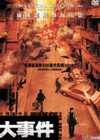
 Johnnie To’s slick action-thriller, Breaking News, demonstrates that the Hong Kong heavyweight can still deliver quite a punch; another great chapter from a rich and greatly varied career. Johnnie To’s slick action-thriller, Breaking News, demonstrates that the Hong Kong heavyweight can still deliver quite a punch; another great chapter from a rich and greatly varied career.
The story opens with a violent clash between cops and criminals, in one of the most visually stunning shootouts committed to film in recent years. Professional thief, Yuen (Richie Ren), and his crew are interrupted during the completion of a heist, placing them in the sights of rogue cop, Cheung (Nick Cheung). When the news crews arrive and film the long shootout in the streets of Hong Kong, the public is outraged at the lack of preparation and protection from the police, and watch as the thieves make their escape. After the crew’s suspected hideout is revealed, bold, new police commissioner, Rebecca Fong (Kelly Chen) proposes that the police invite the media to film what should be a smooth takedown, in order to win back public approval. The events that follow lead both sides of the law into an unpredictable finale with the cameras rolling throughout.
Despite being an action-thriller, Breaking News clearly satirizes the subject of media manipulation and ‘spin’. Therefore the criticism that the film has received with regard to the lack of realism of some of the action sequences misses the point of the film altogether. The direction is sharp and taut, and the Michael Mann style shootouts deliver a stylish and very tense layer of action. But since there is so much more to the film than the gunplay, the action merely plays a supporting role in a far greater story. Commissioner Fong, with her intent on spinning every disaster to make one side look better in the eyes of the viewer seems to pay homage to virtually the whole concept of major media coverage, with slants and angles almost always given their play. The film also possesses a voyeuristic feel, that we the viewers are sitting, watching the violence onscreen no differently from the news crews editing footage from cameras planted in officer’s uniforms. For this reason, I believe this to be one of the bolder, more explicit subjects of Johnnie To’s recent works, in which he has blended these themes and observations with tightly shot action sequences.
The performances are quite varied, with Nick Cheung giving undoubtedly the most charismatic and energetic portrayal of the angry and determined cop, not in charge, but leading the assault nonetheless. Richie Ren gives an interestingly downplayed and subdued performance as the calm, intelligent criminal, but unfortunately Kelly Chen doesn’t appear very interested in what could have been a very rich character, depicting the media manipulator. My personal favorite supporting character was Yip, a cowardly and incompetent taxi driver played by Lam Suet, who is held hostage with his children when the criminals seek refuge in his apartment. This allows sympathy and humanity from Yuen and his crew towards this comedic fool, who, when asked to make food for the thieves, does not know how, as his young children always cook for him. It was very nice to see Simon Yam in a cameo appearance as the police superior, but Yam, the undisputed veteran, is seen here taking a back seat to the younger stars who top the bill.
Whether you’re already a fan of slick, maverick director, To, an action-junkie, or a fan of genuinely smart filmmaking, Breaking News has all this and more. Ignore reviews that bad-mouth the unrealistic action and see the film for yourself. I think you’ll be surprised.
|
 |
 |
Mike Fury 12/7/2006 - top |
 |
 |
Battle Of Wits (2006) |
 |
 |

 In 370 B.C, China was separated as seven nations and several other small tribes, one of these being the city state of Liang. The nation of Zhao is led by the terrifying prime commander Xiang Yangzhong who orders his troops to launch an attack on Liang in a bid to conquer the small city. In 370 B.C, China was separated as seven nations and several other small tribes, one of these being the city state of Liang. The nation of Zhao is led by the terrifying prime commander Xiang Yangzhong who orders his troops to launch an attack on Liang in a bid to conquer the small city.
Leaping to the defence of the cowed people of Liang is a warrior who goes by the name of ‘Ge Li’ from the Mo-Tsu tribe, renowned for its defensive skills. He is their last hope as the terrors of Yangzhong’s troops are unleashed. The future of Liang now hangs in the balance, with all their hopes pinned on the mysterious Mo-Tsu warrior Ge Li…
 It's not everyday that a seemingly generic movie serves up surprises of the immense strength seen here. Although the word immense may carry subjective undertones to each and every movie watcher, getting a powerful anti-war and humanist message thrown into the mix can never be a bad thing. And while certainly not ground breaking in any shape or form and riddled with shocking oversights totally out place in a professional production, A Battle of Wits (ABOW) makes good on its promise in a manner sadly absent from many a supposedly superior project. It's not everyday that a seemingly generic movie serves up surprises of the immense strength seen here. Although the word immense may carry subjective undertones to each and every movie watcher, getting a powerful anti-war and humanist message thrown into the mix can never be a bad thing. And while certainly not ground breaking in any shape or form and riddled with shocking oversights totally out place in a professional production, A Battle of Wits (ABOW) makes good on its promise in a manner sadly absent from many a supposedly superior project.
Once more we're subjected to the oft reused premise of second century China where the seven kingdoms are in an Orwelian state of perpetual war, a condition ABOW at least delivers in a more historically-authoritative fashion. None of that make-believe fictional nonsense suffices, we get names and places that nominally come straight from the history books. At the core of proceedings lies city-state Liang, besieged by the vastly more numerous armies of Zhao. Liang's rather uncaring ruler (Wang Zhiwen who was also in Together) summons for help from legendary warrior-tactician clan Mozi, but only one man turns up: the lone, enigmatic negotiator-style wanderer Ge Li, constantly referred to in the film as Mr. Ge Li for a more meaningful reason than ostensibly presented.
Done by Andy Lau in a somewhat low-profile role for the superstar, Ge Li brings to the fore the usual unwilling class and prime values so essential in a valiant protagonist. The catch here is that for all his conquering charm and military prowess, Ge Li doesn't believe in violence and espouses universal love. He also never really hurts anyone on screen, and manages great victories with the least carnage possible, accepting the necessity of violence with the utmost pain.
Ge Li gathers Liang's resources as the city becomes encircled by the more traditionally-militant Zhao forces. There's quite a few skirmishes and battles with the movie pacing itself nicely, alternating between philosophical ponderings and action as needed. The antagonists are marshalled by General Xiang Yan Zhong, played by excellent Ahn Sung Ki, who provides a link between ABOW and one of its main inspirations, Musa, where Ahn did the skilled Korean archer Jin.
Another element thrown in for good measure revolves around the fledgling love affair between Ge Li and cavalry captain Yi Yue (Fan Bing Bing). However, do not worry about getting this epic spoiled by saccharine distractions. ABOW doesn't hold back the tragic contingent, with one heart-wrenching calamity close on the heels of its predecessor. Sooner or later, a sobering reminder yanks events back to the harsh light of reality, no matter how promisingly ideal.
Throughout the respectable running time available, maneuvering and scheming supplement ferocious combat, but none of it comes across gratuitous. While you sit there enjoying the clever writing and constant surprises, the story moves along beautifully, purveying the deepest, most profound human content seen in this genre, possibly ever. None of the usual bravado and camera-pleasing antics transpire, ABOW shying from pyrotechnics and wire-works to concentrate on a memorable message regarding the horrors of warfare and the fallibility of humanity.
And the grace with which this is conducted must be cherished. Characters steer clear of preachy sermonizing, instead delivering their heart-breaking anguish through organic narrative and fitting context.
But every character has ambiguity written all over it, from Ge Li as undecided about his role and identity, the Liang monarch who's as cruel and bent as can be despite professing love for his people, to the contemplative Zhao general and hapless commoners, this flick has them all.
It does feel a tad rushed in certain places, some scenes obviously cut short, mayhap to avoid a more restrictive rating due to violent content that was left out by ruthless editors. Still, this doesn't detract from enjoying ABOW's deep moral repercussions and excellent story.
What do stand out as sore spots are occasionally ridiculous visual effects and sheer amateurish performances, such as Fan Bing Bing opening her eyes a split second after her character was supposed to close them once and for all. Also, some of the action suffers from over-direction, looking like laughable dance choreography with soldiers stumbling around in an exaggerated manner. Additionally, the voice track was clearly dubbed without any effort to mask the discord inevitable when doing this, resulting in awkward spoken material. This isn't helped much by the almost complete absence of a proper soundtrack.
Avoid thinking these serious pitfalls. With every single participant in the story completely convincing and multi-dimensional, ABOW scores a huge win for a relatively underdoggish release, and none of its minor failings diminish that. Whatever's broken with the movie on hand is more than made up for by its realistic impact, and thirty minutes in you'll be right at home in Liang, oriented to feel it as a real place confronting concrete terror and hope.
Make tracks to the nearest venue showcasing this milestone and see what happens when Hero meets Platoon or Full Metal Jacket. A Battle of Wits is that significant, albeit most likely it will go down in history just as misunderstood as the pan-human principles it seeks to imbue for the benefit of us all.
Rating: * * * * 1/2
|
 |
 |
Lee Alon 11/28/2006 - top |
 |
 |
Triads - The Inside Story (1989) |
 |
 |
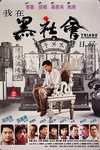
 Li Man-Ho comes to Hong Kong after his father's death following a double crossed peace meeting at the hands of a rival gang. The family's business begins to crumble as rival organizations stir violence and trouble in acknowledgment of this weakness. Li Man-Ho reluctantly agrees after pressure from other members to temporarily act as leader in order to restore stability and order. But he is soon faced with violence, betrayal and confusion, in this world he tried so long to avoid. Li Man-Ho comes to Hong Kong after his father's death following a double crossed peace meeting at the hands of a rival gang. The family's business begins to crumble as rival organizations stir violence and trouble in acknowledgment of this weakness. Li Man-Ho reluctantly agrees after pressure from other members to temporarily act as leader in order to restore stability and order. But he is soon faced with violence, betrayal and confusion, in this world he tried so long to avoid.
 Chow Yun Fat’s forgotten classic. Chow Yun Fat’s forgotten classic.
This is perhaps one of the most brushed over films of not only the career of Chow Yun Fat, but of the Triad genre. The film features an intricate view of the Triad lifestyle, a kind of Hong Kong Godfather, highlighting the highs and lows of the lives these characters lead, and the consequences that follow their actions.
Li Man-Ho (Chow Yun Fat) comes to Hong Kong after his father's death at the hands of a rival gang during a supposedly peaceful meeting. The family's business begins to crumble as rival organizations exploit this weakness by stirring trouble. Li Man-Ho reluctantly agrees after pressure from other members of the gang to temporarily act as their leader in order to restore stability and order. It isn’t long before he finds himself in the middle of this brutal world he avoided for so many years.
One of the most fascinating aspects of Triads is its unformulaic approach to the story, especially for a genre film of this area. It goes against convention and represents many interesting factors setting it apart from other titles. It is a mystery why this film has not received the acknowledgement it deserves. Perhaps due to the pro-Triad slant that this and many others of the genre have been tagged with, notably the Young and Dangerous films --yet the popularity of that series never suffered. Another factor could be that 1989 was a very busy year for Chow, and as a result Triads could have been swept under the carpet in favour of releases like God of Gamblers and The Killer, made the same year. The fact remains that this film has a relatively low budget, and despite a few violent scenes, the story is far more dramatic and character driven rather than being reliant on overuse of action. Chow delivers a role against his typecast as a reluctant gang boss, not the suave, trigger-happy gunman of John Woo Heroic Bloodshed films. After avoiding the position and responsibility of leading the Triad, Li Man-Ho is morally blackmailed into using his intelligence to prevent his father’s gang from being wiped out. Chow is given excellent support by a host of top-rate actors who dominate the screen in equal measure. Shing Fui On, Michael Chan and Roy Cheung deliver performances of intensity and sincerity that stand as some of the strongest in their careers. Director, Taylor Wong, uses a very simplistic and disconnected method of direction, which, at times, gives the film an almost documentary feel in which the camera simply rolls while men are talking in a room and the audience is virtually eavesdropping. This allows for the drama and portrayal of the characters to lead the story in a more fluent and naturalistic way, feeling far less theatrical.
The film contains a large number of references and cultural and historical traditions of the society, which was in fact quite rare for a film at this time. Ceremonies, handshakes, honorary celebrations and their significance were later highlighted in titles such as Johnnie To's Election but very few films displayed this type of historic detail in the 1980s. This once again characterises the film as very different from others in the genre and, arguably, very much ahead of its time.
For those wishing to see a less-known project of Chow’s career or anyone who enjoys a gritty, unflinching gangster film that challenges convention, Triads: The Inside Story is highly recommended.
|
 |
 |
Mike Fury 11/17/2006 - top |
 |
|

|
